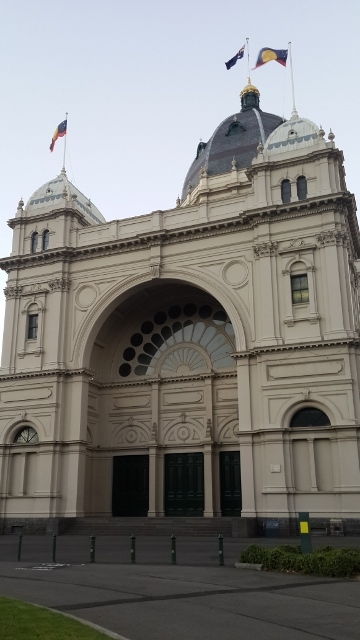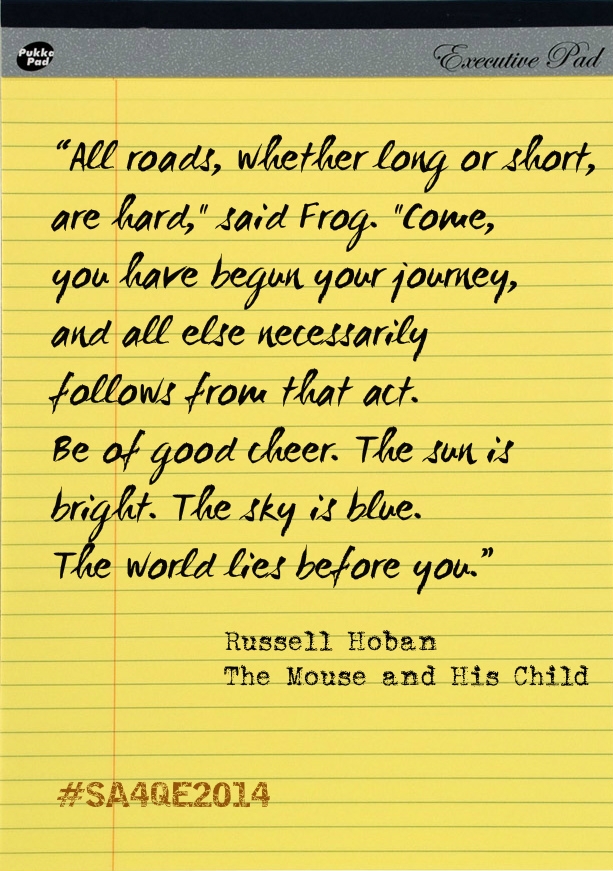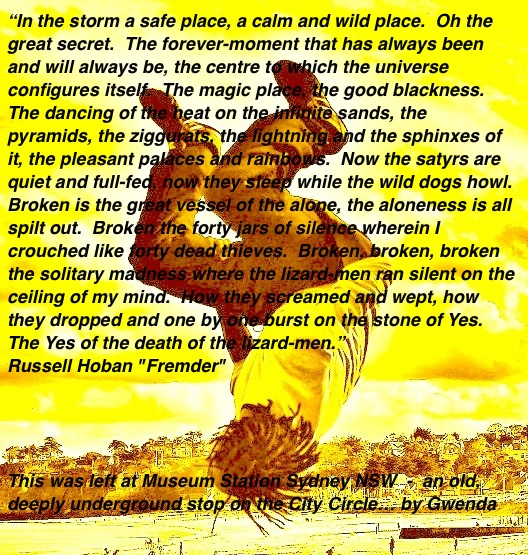Last SA4QE day I was in ambivalent mood, reflecting on my past relationship, so it seemed only right that I quoted from The Medusa Frequency, which is for me Russ's most lyrical, if at times most cynical novel about relationships. In the months that followed I struck up a special friendship with someone who loves the book as much as I do, so for 2014's Hobanic celebrations I again consulted Medusa, this time seeking out passages that resonated more romantically. In this vein I also chose Kleinzeit, which is far from cynical, very romantic, and probably Russ's funniest book.
I wasn't quite sure where to leave the passages I chose - on most SA4QE days in the past I've been in London, a city made for 4qating, but this year I was stuck in my reluctantly-adopted midlands home which doesn't seem quite on the same frequency as the metropolis. I also didn't have much time, nor transport, and round here you can't really go anywhere without a car, so I left all my quotations within five minutes' walk of my flat. It's interesting that once you start walking about, you start to notice lots of spots ripe for 4qation - shopping trolleys, signs, fence-posts all offered themselves up, but I went with the following.




Oh no, thought Kleinzeit when he saw Sister, this is too much. Even if I were well, which I'm probably not, even if I were young, which I no longer am, this is far too massive a challenge and it would be better not to respond to it. Even at arm-wrestling she could destroy me, how do I dare consider her thighs? He considered her thighs and felt panic rising in him. Offstage the pain was heard, like the distant horn in the Beethoven overture. Am I possibly a hero, Kleinzeit wondered, and poured himself a glass of orange squash.
Sister fingered his chart, noticed Thucydides and Ortega on the bedside locker. 'Good morning, Mr Kleinzeit,' she said. 'How are you today?'
Kleinzeit was glad he was wearing adventurous pyjamas, glad Thucydides and Ortega were there. 'Very well, thank you,' he said. 'How are you?'
'Fine, thank you,' said Sister. 'Kleinzeit, does that mean something in German?'
'Hero,' said Kleinzeit.
'I thought it must mean something,' said Sister. Maybe you, said her eyes.
Good heavens, thought Kleinzeit, and I'm unemployed too.
I left this in the free catalogue racks at the local Lidl. The humour and romance in this passage are obvious but most of all I'm drawn to the optimism. Just prior to this scene Kleinzeit has been fired from his job and booked into hospital for a potentially serious illness, and yet suddenly seeing Sister, none of this matters (panic aside, of course...)
'Alone and blind and endlessly voyaging I think constantly of fidelity. Fidelity is a matter of perception; nobody is unfaithful to the sea or to mountains or to death: once recognized they fill the heart. In love or in terror or in loathing one responds to them with the true self; fidelity is not an act of the will: the soul is compelled by recognitions. Anyone who loves, anyone who perceives the other person fully can only be faithful, can never be unfaithful to the sea and the mountains and the death in that person, so pitiful and heroic is it to be a human being.'
This is one of Russ's most famous and most beautiful passages. It soars and transcends. I think I would like it read out at my funeral, in fact. To love and to perceive another person to this extent is something to aspire to.
I had left the Lidl by this point and was thinking of leaving this quotation in an empty shopping trolley, but thought the bus stop adjacent was more appropriate for a character who is "endlessly voyaging". Plus, sellotaping it to a bus shelter might even give the passage a decent chance of being read ;-)
'Do you think about fidelity sometimes?' said the head [of Orpheus].
'Sometimes.' Years after Luise had gone I found inside a copy of Rilke's Neue Gedichte her recipe for bread; I'd never seen her use a written-down recipe but there it was in her writing on a folded-up feint-ruled notebook page marking 'Orpheus, Eurydike, Hermes':
1.5 kg granary flour
2 dessertsp oil
1 " salt
1 tblesp caraway seeds
2 " dried yeast
1½ pts water, bloodwarm
1 teasp sugar
Put flour in a bowl, add oil & caraway seeds. Put sugar & yeast in a jug, add a little of the warm water. Leave for 10-15 mins in a warm place to froth, add salt to warm water. When yeast dissolved, add to the flour and water. Stir, then turn on to a floured board & knead 10-15 mins until it is elastic. Put back in bowl, cover, leave to rise in warm place. When doubled in size, take out, divide into 2, knead & thump, shape into loaves and put in greased tins. Cover, leave for 10 mins in a warm place, then put in oven & bake at 220º for 40-5 mins.
The smell of the brown loaves was like fidelity.
I've always loved this definition of fidelity. Russ was a writer who revelled in "found" items and had no qualms about reproducing an entire recipe in a novel. The one thing I've never done is try to actually make this recipe; I left it too late this year and couldn't get all the ingredients quickly enough, but one day I'll do it. I left this passage in with the loaves at the local Costcutter. The bread at the Lidl is pretty low-fidelity stuff but the corner shop sells fantastic bread made by a local company called John Dwyer Bakery, which is about as faithful as you can get around here without access to yeast and caraway seeds.